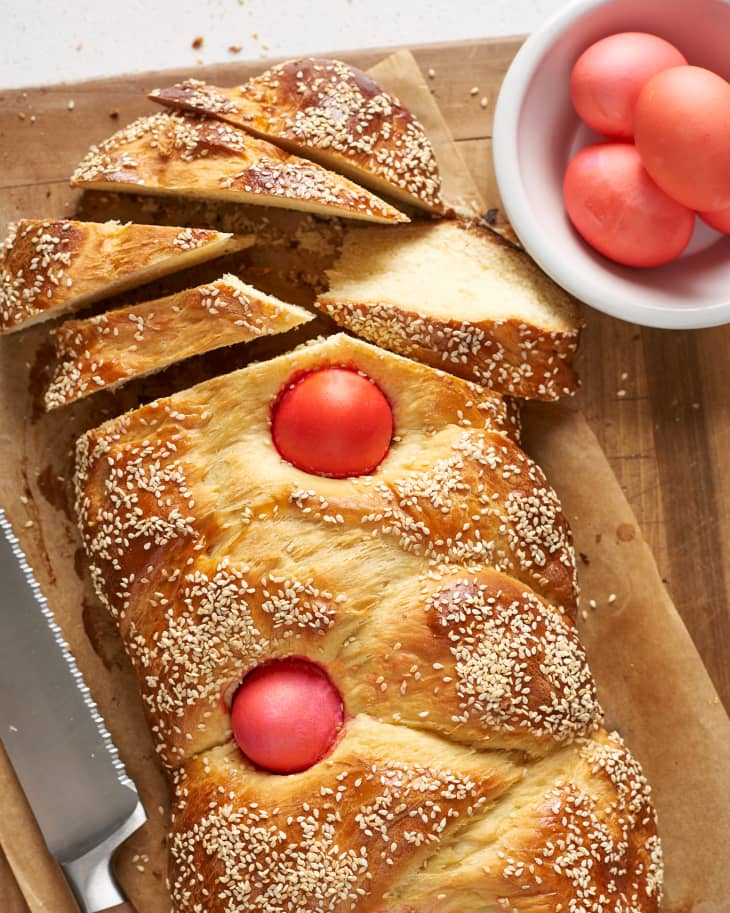10 Things You Should Know About Greek Easter
With a name like Fleischer, you might not think that I’d be Greek or that I’d celebrate Easter. But both are true! My mother is Greek, and we’ve celebrated Greek Easter my entire life. I am aware that this baffles people. Perhaps the most confusing part that people seem to struggle with, however, is what exactly Greek Easter is and how it’s different from Western Easter. Let me explain.
10 Things You Should Know About Greek Easter
1. It’s actually called Orthodox Easter.
First of all, it’s technically called Orthodox Easter. It’s when Orthodox Christians across the world celebrate Christ rising from the dead with a meal. The foods and traditions change by culture (Armenians and Russians celebrate Orthodox Easter, for example!) — and this is how the Greeks do it.
2. We go by a different calendar.
Greek Easter happens to fall on the same day as Easter this year (April 16), but that’s not always the case. See, the Greek church goes by the Julian calendar, implemented by Julius Caesar, rather than the Gregorian calendar. It was the calendar when the Orthodox church was initially set up, and a sizable majority of Orthodox churches have refused to acknowledge the shift to the Gregorian calendar.
3. It’s always after Passover.
Although the date changes year to year, there are some rules that are always consistent. The Eastern church sets the date according to the astronomical full moon; it’s always the first Sunday after the first full moon after the Equinox.
Greek Easter also always falls after the Jews celebrate Passover, because the crucifixion and resurrection of Christ took place after he entered Jerusalem to celebrate Passover.
Read more about Passover: 12 Things to Know About Your First Passover Seder
4. Our Lent is a little different.
Our Lent, which is called Great Lent instead of just Lent, is a little different. We still observe it for 40 days, but we don’t have a choice of what to give up. Where Western Christians can decide to give up things like chocolate, soda, or booze, if you’re Orthodox you’re giving up meat and dairy. Also, no meat, dairy, or poultry dishes are prepared or eaten the week before Easter (fish is sometimes excluded too).
5. Saturday is just as important as Sunday.
When you think of Easter, you probably think of Sunday, right? That’s not wrong, but we also have what’s called Holy Saturday, which is the night before Greek Easter. In some communities, people gather in churches or squares for Easter liturgies. We’ll carry large white candles, set off fireworks, and go home for a giant midnight meal to end our fasting.
6. There are two key phrases.
You will hear Christos Anesti as a greeting (people say it as if it means happy Easter, but it literally translates to “Christ has risen!”) and Alithos Anesti as a reply (literally translated, “Truly, he has risen!”).
7. There will be lamb.
If you’re lucky, you will see a whole lamb being roasted on a spit in someone’s backyard. If not, chances are there will still be some sort of roasted lamb dish.
We eat lamb because it carries religious significance. I’m sure you know that a sacrificial lamb is a person or animal sacrificed for the common good. In The Bible, John the Baptist refers to Jesus by saying, “Behold the Lamb of God who takes away the sin of the world.”
To sacrifice a lamb is to atone for one’s sins; to eat lamb on Greek Easter is to acknowledge Jesus sacrificing himself for the sins of everyone else.
More on Lamb
- How To Roast a Leg of Lamb
10 Easy and Delicious Lamb Dishes
- 5 Important Things to Know About Cooking a Leg of Lamb
8. You’re going to eat a lot.
In addition to the lamb, Greek Easter involves koulourakia (a buttered pastry), pita bread with tzatziki, golden roasted potatoes, spanakopita, and tons of other stuff. If you’re going to a Greek Easter, you’re going to eat — a lot.
Get a Recipe
9. Our eggs are always red.
There are eggs at Greek Easter, but instead of cutesy pastels, dip-dyes, or other wacky designs, our eggs are dyed red to signify the blood of Jesus. The hard shell symbolizes the sealed Tomb of Christ, and the cracking of the egg symbolizes Jesus’ resurrection from the dead.
After dinner, there’s a mini competition with the hard-boiled eggs that goes like this: One person (playing the offense) taps the tip of their egg against the tip of another person’s egg (the defense). If the defensive player’s egg cracks, they’re out. If the egg stays whole, they move on to wreak havoc on the next person’s egg. Some sneaky folks will use a wooden egg and hope that no one will notice! Whoever ultimately wins will also win a year of good luck.
10. All the family comes and everyone is welcome.
We’re talking cousins (and your cousins’ cousins). The Greek family is a tight-knit one and even welcomes non-family. We have this thing called xenia, which means hospitality and literally translates to “guest-friendship.” It basically means we welcome everyone and practice gentleness.
